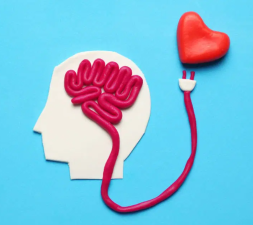Emotions such as fear and anxiety can speed up the heartbeat, so conversely, if the heartbeat speeds up, will it cause anxiety or fear?
We all know that there is a connection between emotions and physical sensations: when you hear a scary sound, the hair on your arms will stand up; when you hear bad news, you will have a sinking feeling in your gut.
But is it the emotions that manipulate the body, or the body that manipulates the emotions?
According to two preliminary studies to be presented at the 2023 American Heart Association Annual Scientific Sessions, the heart and brain are closely connected, and depression, anxiety and chronic stress can increase the risk of heart and brain complications.

How Emotions Affect the Physiological Mechanisms of the Heart
Short-Term Reactions
When a person is stressed or angry, the sympathetic nervous system is activated, releasing adrenaline and cortisol. These hormones increase heart rate, constrict blood vessels, and temporarily raise blood pressure to meet the body's stress response.
For example, a sudden fright can cause palpitations or a skipped heartbeat, a sensitive response of the heart to hormonal changes.
Long-Term Effects
Chronic stress or depression continuously activates the sympathetic nervous system, leading to endothelial damage, increased inflammatory factors, and accelerated atherosclerosis.
Studies show that people with chronic anxiety have a 40%-50% higher risk of coronary heart disease than the general population.
Specific Effects of Different Emotions on the Heart
Negative Emotions
- Anger and hostility: Easily induce "broken heart syndrome" (stress-induced cardiomyopathy), manifested as chest pain and shortness of breath, and in severe cases, can lead to heart failure.
- Anxiety and fear: Increase the risk of ventricular arrhythmias and may even trigger cardiac arrest.
- Depression: Slows down cardiac recovery; mortality rates are 2-3 times higher in myocardial infarction patients with depression.
Positive Emotions
- Pleasure and Relaxation: The parasympathetic nervous system dominates, increasing heart rate variability (a marker of enhanced cardiac adaptability), which helps reduce inflammation levels.
- Social Support and Well-being: Harvard University research found that people with stable social relationships have a 30% lower incidence of heart disease.
In two new studies, researchers analyzed the extent to which a person's mental state affects heart health.
The first study explored the mechanism by which mental state affects heart health. The study found that anxiety and depression accelerated the development of new cardiovascular disease risk factors. 38% of participants developed new cardiovascular risk factors during follow-up, such as high blood pressure, high cholesterol or type 2 diabetes. Depression and anxiety increase the risk of major cardiovascular events such as heart disease or stroke by about 35%. People with a higher genetic tendency to stress developed their first cardiovascular risk factor at a younger age (an average of 1.5 years earlier than those without genetic markers).
In another study, researchers explored the impact of cumulative stress on heart and brain health. Over a one-month period, researchers integrated general daily stress, psychosocial stress, economic stress, and neighborhood stress into a "cumulative stress score." After adjusting for risk factors such as high blood pressure, high cholesterol, smoking, and type 2 diabetes, as well as income and education factors, the researchers found that increased cumulative stress may lead to a 22% increase in the risk of atherosclerosis and a 20% increase in the risk of overall cardiovascular disease. People with higher scores are also associated with high blood pressure, overweight, lack of exercise, and smoking.
The analysis also showed that persistent stress increases the risk of poor heart and brain health in two ways: directly affecting physical health, and indirectly leading to a decline in cardiovascular health by increasing unhealthy lifestyles (smoking, sitting for long periods of time, etc.).

